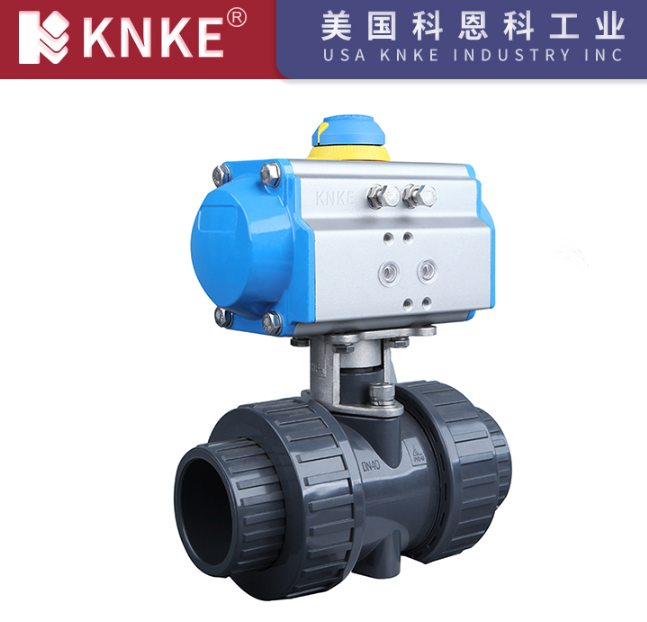Advantages of Ball Valves
Ball valves are essential components in fluid control systems and are widely used across various industries. These valves, which are derived from plug valves, feature a spherical valve element that rotates around the valve stem’s axis to control the flow of fluids. Ball valves are primarily used to shut off, distribute, and alter the direction of material flow in pipelines. In addition to these basic functions, V-ball valves also provide excellent flow regulation capabilities. Below are some of the main advantages of ball valves.

1. Minimal Flow Resistance
One of the most significant advantages of ball valves is their almost negligible flow resistance. When the valve is fully open, the fluid can pass through the spherical channel inside the valve body without any physical obstruction. As a result, ball valves effectively reduce energy losses within the pipeline and improve system efficiency.
2. Excellent Corrosion Resistance and Reliability
Ball valves operate without lubricants, which makes them less prone to seizing during operation. This design allows ball valves to perform reliably in aggressive or corrosive media, as well as low-melting-point liquids. This makes them highly suitable for use in harsh environments such as petrochemical, natural gas, and chemical processing industries.
3. Complete Sealing Performance
Ball valves can achieve complete sealing across a wide range of working pressures and temperatures. Thanks to their precise construction and spherical sealing design, ball valves prevent any leakage when closed, ensuring the safety and reliability of the system.
4. Fast Opening and Closing with Quick Response
Many ball valves are designed for rapid opening and closing, with cycle times ranging from 0.05 to 0.5 seconds. This feature is especially useful in automated control systems, where quick shifts in flow direction or stopping of flow are required. Ball valves provide a reliable solution for these applications, ensuring fast and efficient fluid control.
5. Automatic Accurate Positioning
Ball valves feature a self-aligning ball element that automatically and accurately positions itself in the open or closed position, without the need for manual adjustments. This ensures the valve’s precision and longevity, while also reducing the need for regular maintenance.
6. Reliable Dual-Side Sealing Performance
Ball valves provide reliable sealing on both sides, ensuring that they can maintain tight seals even in high-pressure or high-temperature environments. This capability allows ball valves to operate safely and effectively in complex working conditions.
7. Corrosion-Proof Design
When the ball valve is fully opened or closed, the spherical element is isolated from the medium, preventing corrosion of the sealing surfaces. Depending on the material of the valve, this design minimizes the risk of corrosion on the valve body, extending the valve’s service life.
8. Compact Structure and Lightweight
Ball valves have a compact structure and are lightweight, which makes them particularly suited for use in cryogenic systems. Their simple design eliminates the need for many complex components, making them cost-effective, easy to install, and simple to maintain.
9. Ability to Withstand Pipeline Stresses
The symmetric design of the ball valve body, particularly in welded valve body structures, enables it to withstand stresses exerted by the pipeline. This robust construction helps prevent damage caused by pressure changes within the pipeline, ensuring the valve remains stable and operational.
10. High Differential Pressure Resistance
The closing elements of ball valves can withstand high differential pressures, ensuring reliable sealing even when there is a significant pressure difference across the valve. This feature makes ball valves particularly effective in high-pressure applications.
11. Long Service Life and Suitable for Underground Use
Fully welded ball valve bodies can be directly buried underground, protecting the valve components from corrosion. This design extends the valve’s service life, which can be as long as 30 years in some cases. As such, ball valves are ideal for use in oil, natural gas, and other pipeline systems that require long-lasting, corrosion-resistant valves.
Ball valves offer numerous advantages, including minimal flow resistance, excellent sealing performance, resistance to corrosion, and fast opening and closing times. These features make them indispensable in many industrial pipeline systems. Whether in petrochemical, natural gas, food processing, or water treatment industries, ball valves provide efficient and reliable fluid control solutions. Their compact structure, long service life, and high-pressure tolerance further enhance their suitability for use in challenging environments, making them a preferred choice in modern fluid control systems.
